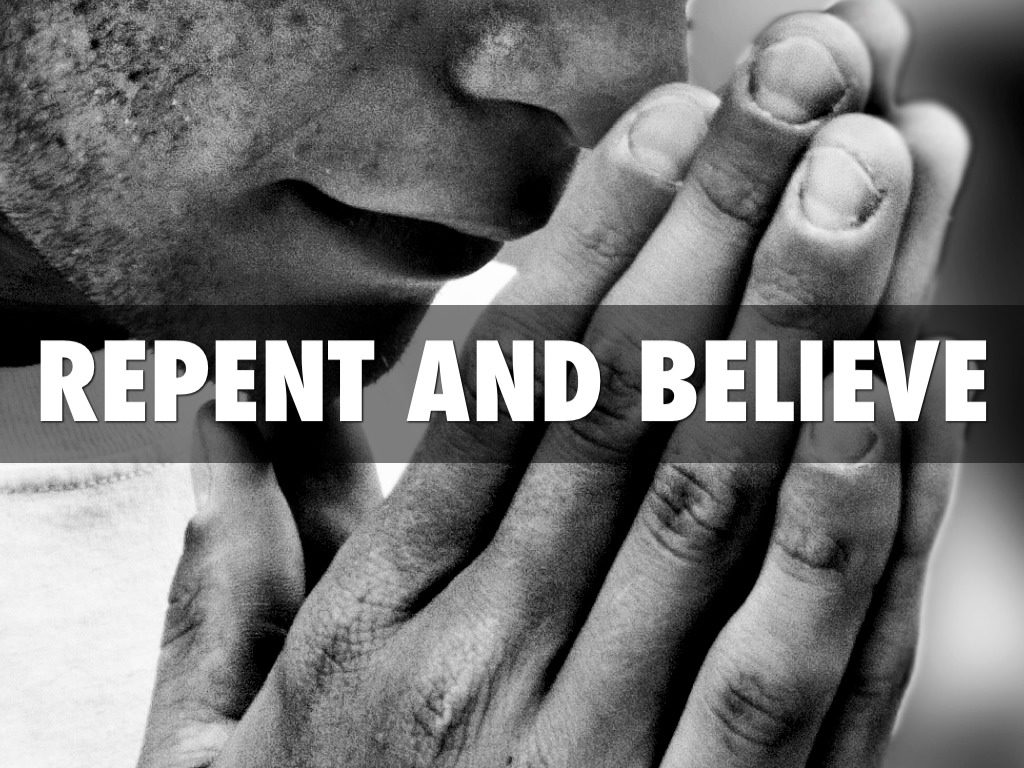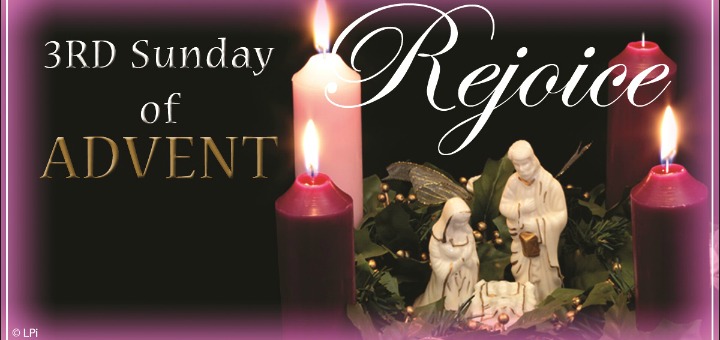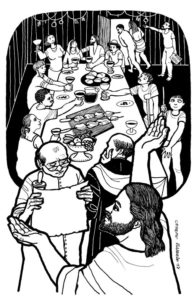Mar 14, 2018
Reflection: Christ’s victory is that of believers.

Gospel (John 12:20-33). “When I am lifted up from the earth I will draw all people to myself”.
Reflection. Christ is speaking to us and encouraging us in today’s Gospel reading, since, as the Second Vatican Council (Document on Sacred Liturgy, paragraph 7) reminds us, Christ is present in his word, as it is he himself who speaks when the holy scriptures are read in the Church.
A message with believers in this dialogue with ourselves and the society in which we live from today’s Gospel reading is that for Christ his crucifixion is a victory, his victory over all forces opposing his saving work, this “world”, the power of the devil and any other power. Jesus says all this to give confidence to his followers. He has given his victory to them. “I have said to you so that you may have peace. In the world you will have persecution. But take courage; I have conquered the world” (John 16:33). The same message is for believers of all generations in time of attacks on their faith. Christ and the Holy Spirit are in their hearts and consciences to strengthen then. “The One who is in you is greater than the one who is in the world” (1 John 4:4), meaning any force trying to draw you away from Christ and the church. A little later the same writer gives the encouraging words of the victory of faith over adverse forces (“the world”); “Who it is who conquers the world but the one who believes that Jesus is the Son of God?” (1 John 5:4).
The victory of which Christ speaks, won by him and given to believers, presumes that believers remain united with him, taking Jesus’ example of the grain of what, and dying to one’s passions and sinful ways.
If we pass from reflection to dialogue with “the world”, with the society of our own day, sometimes unbelieving, we can bear the advice of 1 Peter 3:15-16 in mind: “Always be ready to make your defence to anyone who demands from you an accounting of the hope that is in you; yet do it with gentleness and reverence”. Believers are involved in social life at all levels, the cultural, the political and others as well. But in all this they believe in the prime demands of Christ, recalling his words: “Whoever loves father or mother more than me is not worthy of me” (Matthew 10:37). The same would hold true (and much more so) for country, political party or anything else. There cannot be question of country or political party first and one’s Christian religion (which means the demands of Christ) afterwards. If such assertions are made, it can clearly be pointed out that allegiance to Christ and his Church does not take from political or cultural commitments.
It may not be too often that a person is called on to decide between allegiance to Christ, one’s religion, Church or political party or country. There is, of course, no intrinsic incompatibility between allegiance to Christ, the Church and social commitments. The contrary is the case, as devotion to God and Church has inspired and continues to inspire, involvement in community development.
Martin McNamara MSC
Jan 17, 2018
Reflection: Change of heart and believe in the Gospel

Gospel (Mark 1:14-20). Repent, and believe the Good News.
There is material for personal reflection and dialogue with any period in history in this Gospel reading. Jesus’ call in the Gospel to repent, for a change of heart, and belief in the Gospel, is addressed to individuals and society in any age of history. The repentance spoken of in the Gospel reading means a change of heart and a change in one’s ways, and is practically the same as belief in the Gospel. That call was valid for every person and society of Jesus’ day, and later, and is still valid in our own day. All Jesus’ disciples, from Simon (Peter), Andrew and others onwards had to make that change of mind and direction. For the first disciples and the Jewish community of Jesus’ day it would have meant a change from what was central to their lives directed by their tradition and the law of Moses to the Gospel and its values. The same principle held when the Gospel message was preached beyond Judaism, to Greek and Roman culture. There, too, it was a call to a change of focus and ways to the Gospel and its message, to the new community of believers created by the Gospel.
For us and the Church today the call still holds, but it is not always easy to determine what change of mind, of mindset, of direction, is indicated by Jesus’ original call. It will, however, always mean putting Jesus’ call and Gospel values first and turning aside from everything contrary to them. Today’s first reading from the prophet Jonah provides material for reflection. Jonah was a grumbler, getting angry about many things, including God’s mercy for the detested city Nineveh. God’s reply to him, which serves as an ending to the entire book, is very telling. God says: “Should I not be concerned about Nineveh, that great city, in which there are more than a hundred and twenty thousand persons who do not know their right hand from their left, and also so many animals?”
In our own day the Church is trying to find ways in which to enter into dialogue with contemporary life and culture, and how it should change its mind and ways so as to make the abiding love and mercy of God (made so clear to the grumbling Jonah) better known to the modern mind, while at the same time remaining true to the Gospel message. Pope Francis is particularly interested in all this. We can all reflect on these truths and pray to God that any dialogue will have a positive outcome.
Dec 12, 2017
Reflection & Dialogue: Joy of Christian believing, and loathing on its rejection
Gospel (John 1:6-8, 19-28). There stands among you – unknown to you – the one who is coming after me.

This third Sunday in Advent has been traditionally known in the Latin liturgy as Gaudete Sunday, from the opening word of the entrance antiphon Gaudete¸”Rejoice”, from the letter to the Philippians 4:4-7, a text given in full in the earlier Latin liturgy and still used in part in the present entrance antiphon, and still as reading two in year 3 of the present lectionary. The text of Philippians 4:4-7 is as follows: “Rejoice in the Lord always; again I will say, Rejoice. Let your gentleness be known to everyone. The Lord is near. Do not worry about anything, but in everything by prayer and supplication with thanksgiving let your requests be made known to God. And the peace of God, which surpasses all understanding, will guard your hearts and your minds in Christ Jesus.” Paul expresses the same sentiments in his very first letter, written to the Thessalonians, given as today’s second reading: “Rejoice always; pray without ceasing”.
The Gospel reading from the Gospel of John is about John the Baptist’s witness to Christ, as the One who was yet to come. John was not the Messiah, the Christ, but the forerunner to be witness to him. Later in the same Gospel (John 3:28-30) the Baptist will bear similar witness to Jesus, with mention of his joy that t he Saviour has come: “You yourselves are my witnesses that I said: ‘I am not the Messiah, but I have been sent ahead of him. He who has the bride is the bridegroom. The friend of t he bridegroom stands and hears him, rejoices greatly at the bridegroom’s voice. For this reason my joy has been fulfilled’”.
Today’s readings invite us to reflect on the importance of rejoicing, of joy, in Christian life, in human life, and of the close connection between joy and the coming of Christ into our world, and on Christ’s own emphasis on the joy of believing in him and his mission. At his birth, recalled at Christmas, the Angel declared to the shepherds that with this was bring good news of great joy for all the people. Jesus himself rejoiced in the Holy Spirit and thanked his Father, Lord of heaven and earth, that he had hidden the mysteries of salvation from the wise and intelligent and revealed them to infants, that is to his own followers. Christian joy is connected with the new age revealed in Christ and his Church.
The theme of joy is prominent in Jesus’ prayers and teachings as presented in the Fourth Gospel. Jesus prays that his own joy may be in his disciples and that their joy may be full. He forewarns them that in this world they will have trials, but after trials their sorrow will turn into joy. Their hearts will rejoice and they will have a joy that no one can take from them. The disciples are asked by Jesus to pray (to the Father) that their joy may be full, and their prayer will be heard. The Beatitudes end by linking persecution with joy. Blessed, happy, are the followers of Christ when ill-treated and persecuted on account of the Son of Man. They should rejoice in that day and leap for joy, for surely their reward is great in heaven. It is clear from these texts that Christian joy is rooted in belief in Jesus Christ and in the new age that has come with him and continues in the Church which he has founded. This joy goes with love and respect from the Church.
This love for the faith, and the joy that accompanies it, has been a central part of the Christian heritage down through the centuries. It has also been very much part of the Irish tradition right from the beginning. Matters have been changing very much in the older western world over recent centuries, and in Ireland over the past decades. Christianity has been abandoned by a number of the learned class, and more recently by the general public. In some writers there is a quest for redemption, but not that of Christian tradition, a form of redemption and hope in mankind’s ability to show compassion, love and find an individual spirituality.
On this Gaudete, Rejoice Sunday, it is well to recall the hatred can be produced in some who reject the salvation, the redemption, brought by Christ and still proclaimed by the Church. Dialogue might help bridge the gap between the two visions of life here and beyond.
Martin McNamara MSC
Nov 15, 2017
Reflection: Watch. Keep awake. The End of the Liturgical Year; the End of Life and of the World. Prepared to render an account.
The Gospel (Matthew 25:14-30). You have been faithful in small things; come and join in your master’s happiness. The parable of the talents, read in today’s Gospel, can be easily understood, and its message is clear: we should make good use of the gifts which the Lord, God, has given us, and be aware that we will have to render an account of their use to the Lord in due time. Fundamentally, a talent was a weight of 80 pounds, or 36 kilograms. We are then not surprised to see how in the parable one of the persons involved dug a hole in the ground and hid the single talent. A talent had also money value, and in this context it is reckoned to be equal to six thousand (6000) denarii, a single denarius being the ordinary daily wage of a workman. This would mean that a single talent would be equal to twenty years (some would say more that fifteen years) wages for an ordinary workman. The word talent is also used in the sense of gift, natural endowment. The message of the parable, as has been noted, is that people should use the gifts, the talents, whether great or small, which the Lord has given them. Although five talents, or even two, was a large amount, in his reply to those who used them with profit, the Lord calls them “small things”, and they are invited to join in the master’s happiness – which in the Christian context of the parable would mean eternal bliss.
As a parable in itself, this one could fit into any part of the Gospels. However, in its present context it forms part of Jesus’ final discourse on the Last Things, which has as its central theme: Watch, stay awake, be prepared for the day and the hour. Immediately before this parable we have that on the Ten Bridesmaids, with the same theme, and immediately after it Christ’s discourse on the Final Judgment, the Judgement of the Nations. It is thus a suitable reading for this Sunday, at the end of the liturgical year.
Traditionally, at the end of the liturgical year and at the beginning of Advent the Church in the Sunday liturgy devoted its attention to the Last Things, and to the importance of being prepared to meet the Lord at the particular judgment that follows earthly death. No great attention is paid today to death and to the importance of dying in God’s grace, or even to Paul’s advice to the Thessalonians to live as children of the light, according to the teaching of the Gospel and the teaching of the Church. And even if these truths are forgotten, death can come suddenly, as a thief in the night.
There is further material for reflection in today’s Gospel reading that everyone should use their God-given talents, whether great or small., to the best of their ability for their own good, that of their neighbour and of the entire community.
Martin McNamara MSC
Nov 1, 2017
DON’T JUST TALK THE TALK
Do as they say, not as they do. That is what Jesus said about the religious leaders of his time. Could he say that about leaders in the Church today? Could he say that about Christians today?
Speaking as a cleric, a religious brother and a leader in God’s family, today’s reading always gives me pause. “Call no one father for you have only one Father who is in Heaven.” Does Jesus actually mean that? If so, then why do we call priests father?
The heart of what Jesus is saying I think is that in the family of God, no one is better than anyone else. We are all a mixture of saint and sinner. We are all equally loved by God our Father, our Abba.
At the time of Jesus many religious leaders used to lord it over the people. They demanded taxes from the people without a thought for whether this would push people into poverty or homelessness. In medieval times many bishops and priests saw themselves as aristocrats.
This is not Jesus’ vision of the Kingdom or of the Church. Jesus reminds us that we are all brothers and sisters. He tells us that we have one teacher or rabbi, His Spirit.
Sure we have different roles. Some are chosen for leadership but in the Church leadership is a service. It is a service of listening, of empowering, of involving and of raising up. It is trying to serve as Jesus served.

Oct 13, 2017
Reflection & Dialogue: All welcome within the Church, but a wedding garment of grace called for.
The Gospel (Matthew 22:1-14).

Invite everyone you can find to the wedding.
The Church likes to portray herself as an open church, open to  everyone, irrespective of race or social class, with compassion and understanding for the poor and the marginalized. This can even be proclaimed from the altar: all are welcome here. But in our own day, in the society in which we live and within the Church itself, there are individuals and groups who do not believe that they are welcome within the Church, such as the divorced and remarried who are barred from receiving Holy Communion, active homosexuals, those in gay unions or gay marriage, people involved in extra-marital sexual activity, advocating freedom of choice with regard to abortion, and others besides. Those who condemn or do not accept such persons are sometimes, if not often, accused of laying heavy burdens on them, and occasionally even compared to the scribes and Pharisees of Jesus’ day, of whom Christ said that they tie up heavy burdens, hard to bear, and lay them on the shoulders of others, but they themselves are unwilling to lift a finger to move them.
everyone, irrespective of race or social class, with compassion and understanding for the poor and the marginalized. This can even be proclaimed from the altar: all are welcome here. But in our own day, in the society in which we live and within the Church itself, there are individuals and groups who do not believe that they are welcome within the Church, such as the divorced and remarried who are barred from receiving Holy Communion, active homosexuals, those in gay unions or gay marriage, people involved in extra-marital sexual activity, advocating freedom of choice with regard to abortion, and others besides. Those who condemn or do not accept such persons are sometimes, if not often, accused of laying heavy burdens on them, and occasionally even compared to the scribes and Pharisees of Jesus’ day, of whom Christ said that they tie up heavy burdens, hard to bear, and lay them on the shoulders of others, but they themselves are unwilling to lift a finger to move them.
This question is being closely examined today by the Church authorities themselves. It is an old problem, going back probably to the days of the evangelist Matthew, and it is possible that today’s Gospel reading may give a better understanding of the problem. Everybody, sinners and others, are called by God to enter the Church, and the Church must be the messenger of God’s mercy for the entire world and for its own members. Christ invited all, weary and carrying heavy burdens, to come to him to find rest, saying that his yoke is easy and his burden light. We should also remember, however, that he also told disciples that if they wanted to be his followers that they should deny themselves, die to themselves, take up their cross and follow him. Central to the Christian message is that of dying and rising again with Christ, dying to an old way of life and living a new life in Christ.
To return to the questions under discussion: we may, indeed we must, say that the Church, that is all of us, must be understanding and compassionate, not putting on other people’s shoulders burdens hard or impossible to bear. But with regard to the questions currently being raised, the Church must examine closely whether all or some of them belong to what is regarded as the deposit of faith and morals, that is unalterable truths, or are just part of a way of life and belief that belong to past ages. Although there have been, there are, and there will be, sinners within the Church, all are constantly called by God to repent. The Church is a light for the world. The followers of Christ are called to be the salt of the earth and the light of the world, through their good works. These are truths to be considered in the consideration of the questions now being raised and discussed.
The teaching of the Church, of the Gospel, must be looked on as Christ’s teaching. It is Christ who is speaking through his Church. Christ invites the weary to come to him and take a rest, today as he did while on earth. He would still say that his yoke is easy and his burden light. But Christ also said that his followers must die to themselves, take up their cross and follow him. Let us pray that the present questioning and discussions will issue in a better knowledge of Christ and his yoke and the burdens he asks believers to carry.






 everyone, irrespective of race or social class, with compassion and understanding for the poor and the marginalized. This can even be proclaimed from the altar: all are welcome here. But in our own day, in the society in which we live and within the Church itself, there are individuals and groups who do not believe that they are welcome within the Church, such as the divorced and remarried who are barred from receiving Holy Communion, active homosexuals, those in gay unions or gay marriage, people involved in extra-marital sexual activity, advocating freedom of choice with regard to abortion, and others besides. Those who condemn or do not accept such persons are sometimes, if not often, accused of laying heavy burdens on them, and occasionally even compared to the scribes and Pharisees of Jesus’ day, of whom Christ said that they tie up heavy burdens, hard to bear, and lay them on the shoulders of others, but they themselves are unwilling to lift a finger to move them.
everyone, irrespective of race or social class, with compassion and understanding for the poor and the marginalized. This can even be proclaimed from the altar: all are welcome here. But in our own day, in the society in which we live and within the Church itself, there are individuals and groups who do not believe that they are welcome within the Church, such as the divorced and remarried who are barred from receiving Holy Communion, active homosexuals, those in gay unions or gay marriage, people involved in extra-marital sexual activity, advocating freedom of choice with regard to abortion, and others besides. Those who condemn or do not accept such persons are sometimes, if not often, accused of laying heavy burdens on them, and occasionally even compared to the scribes and Pharisees of Jesus’ day, of whom Christ said that they tie up heavy burdens, hard to bear, and lay them on the shoulders of others, but they themselves are unwilling to lift a finger to move them.